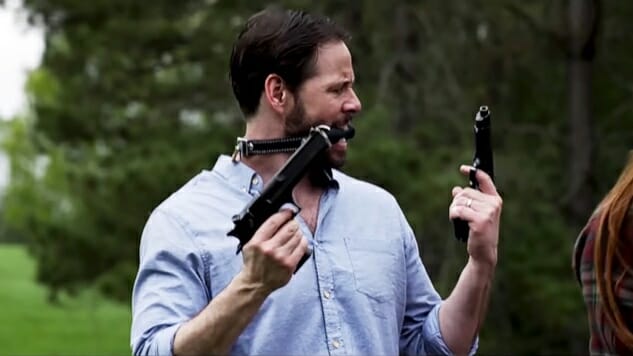The Hunt Has Always Been On
Why ever could the rich-hunting-the-poor genre be having a resurgence?

Note: This article contains spoilers for movies with plots that barely deviate from a 1924 short story.

“This girl is one of your poor people, and I guess you guys felt it was okay to subject her to inhuman conditions because there was no chance of it ever hurting you. It’s sort of the sociopolitical equivalent of, say, a suit of power armor around you?” —Rick & Morty, S2 E9, “Look Who’s Purging Now”
Some movies are in poor taste, and it’s easy to explain how: The tone-deaf rom com that treats its female lead like a trophy, the red meat actioner whose every faceless mook just so happens to be brown, anything starring Steven Seagal. Dumb and regressive as they are, they should be made and they should be screened, and they are not worthy of the kind of moral panic that we saw over The Hunt a film originally slated for a September 27 release that Universal has sidelined in the face of howling from, among others, President Trump, ostensibly objecting to the idea of wealthy liberals killing poor people who superficially code as rural conservatives.
If the trailer is an accurate representation of the movie’s premise (I have not and now probably will never see a screener), then it’s a story of snobby rich elites paying for the privilege of hunting down and murdering a hapless group of regular folk, setting up Hillary Swank as the emcee of the bloody hunting season and Betty Gilpin and others as the unfortunate people playing the part of prey. Universal pulled the marketing in the wake of the somewhat-worse-than-normal shootings in Dayton and El Paso in August, but it’s hard not to believe that the presidential badmouthing really led to it.
It’s a frustrating decision for a few reasons, not the least of which that nobody should give any president, let alone this one, the indication that anything he says should affect whether a movie is released. Another reason is that any movie about lower-class people getting killed by rich assholes is going to end with the rich assholes having the tables turned on them, or else it is a badly written movie. Until the inevitable leak that puts it on The Pirate Bay, we won’t really know whether it’s a nuanced thriller or a proudly dumb shot at “champagne liberals” or “arugula elites” or whatever froofy-sounding epithet we’re using now. As it comes from the same studio that gave us Get Out, one is willing to at least entertain the idea it could be the former.
What’s more interesting is why a story that’s been adapted to film over and over again in past decades is having a resurgence now.

Like many of the great journeyman writers of 20th century pulp, Richard Connell is far less well-known than his one high-profile success. Published in 1924, his short story “The Most Dangerous Game” told the story of a hunter, Sanger Rainsford, who is shipwrecked in the Caribbean on his way to hunt jaguar. There, in language that vividly recalls late-Gothic works like Dracula, he encounters the foreboding castle of General Zaroff. At first Zaroff invites Rainsford in to tend to his wounds and feed him, but soon enough the general reveals that Rainsford is to participate in Zaroff’s favorite pastime: hunting people for sport.
Rainsford is cheerily informed he’ll leave the island alive if he can survive three days without Zaroff killing him. Man, you see, is the most dangerous game, and a jaded old hunter like Zaroff will accept no lesser thrill. He toys with Rainsford—at one point standing directly under the tree the desperate man is hiding in but pointedly not looking up.
It’s not a level playing field, of course, because real competition is only fun if you’re good at it. Zaroff is good at owning lots of hunting dogs, employing flunkies who do his bidding, and having ranged weaponry. The thought that the unarmed Rainsford stands any sort of chance against him is laughable, but so is the thought that Zaroff is any sort of predator without rigging the game in his own favor in every way. In RKO’s 1932 film adaptation, as in the story, Zaroff has just enough time to congratulate his former quarry on surviving before Rainsford pays him back thoroughly.

